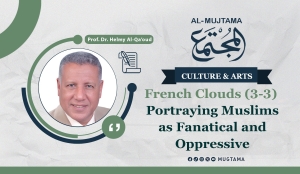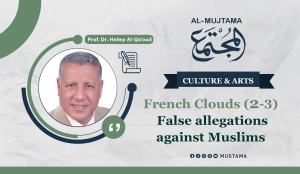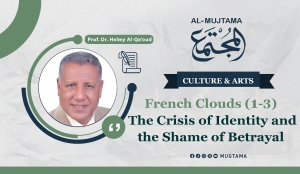French Clouds (3-3) Portraying Muslims as Fanatical and Oppressive
February 14, 2025Demonization of Muslims
And why does the fictional narrative insist on demonizing Muslims and portraying them as fanatical and oppressive while describing the Christian as a gentle beloved person steadfast in his faith no matter the torture he faces? Why did Umm al-Noor not save those who believe in her and see her with them during their torture and exposure to horrific injustices? Was "Shame on you, Christian" among the legislations of the conquering Islam? Or of the Muslim guests in Egypt, as described by Bishop Bishoy? Has the world ever heard that Muslims asked a Christian to announce his Islam to save his life? In what book or time? Does this Christian, who is forced to convert to Islam, add strength to the Muslims?
Islamic Teachings on Religious Freedom
The Holy Quran explicitly declares it. (Let there be no compulsion in religion, for the truth stands out clearly from falsehood.) (Al-Baqarah:256) Armed fanaticism with sick imagination is coming from the other side, and I believe that the general Egyptian public now hopes to enjoy some form of distinction in economics, politics, administration, and culture, similar to what the sect enjoys!
The question now is why do regime writers care to play the victimhood of the sect that has become distinguished and above the overwhelming majority? This is hinted at by some aspects of the novel 'French Clouds.
Thresholds and Endings
The cover of the novel features three primary colors: red, yellow, and blue, along with other mixed colors that almost resemble the color of the French flag. There is a large image of a face that is difficult to classify as either male or female. The title of the novel is written in a modern font closer to the Kufic style, with equal font size between the author's name and the title, as if expressing the author's self-confidence and strong presence; I would not go so far as to say narcissism.
There is another title for the novel in English, "French Clouds," and I am unsure of the significance of having a foreign title for a reader who is presumed to be Arab, considering that the language of the novel is Arabic. Does an affinity for belonging to a culture different from our Arab-Islamic culture represent a form of modernity and enlightenment, knowing that the author is supposed to have grown up within the Arab-Islamic culture, raised by her father who is described as an enlightened Azhar scholar?!
Cultural Affinity and Modernity
One's upbringing in a certain culture does not necessarily mean that they believe in it; every individual has their own free or directed choice. However, social conventions impose that there should be some level of compatibility and a basis from which to operate. The publisher of the novel is Dar Averroes ibn Rushd, and there are some intellectuals in the Arab world who see Ibn Rushd as a symbol of rationality and free thinking, which in their claims departs from the culture of imitation and closure that they believe governs Islamic thought.
This is a major falsehood propagated by some opponents of Islam and a handful of sectarians, in addition to opportunists who are not concerned with thought, reason, or beliefs, but rather with narrow personal interests. Ibn Rushd is a proponent of Islam who believes in revelation and does not consider it a mere historical product. He is a Muslim who performs his prayers and other forms of worship according to what revelation dictates.
Islamic Thought and Disagreement
The space for disagreement that Islam grants its believers is not unique to Ibn Rushd; many Muslim scholars and imams of different schools, as well as various sects and groups, have strived within the framework of revelation, sacred scriptures, and the noble hadith, doing what Ibn Rushd did and even more. However, it seems that some are attempting to secularize Ibn Rushd and detach him from Islam under the banners of modernity, enlightenment, and rationality.
Al-Ghazali and Ibn Rushd
A naive question comes to my mind: why do they adopt an antagonistic stance towards Imam Abu Hamid al-Ghazali, for example? Is it because he played a significant role in guiding Muslims to fight against the invading Crusaders in his time? Is it because he prepared his people through education and knowledge to face the tidal wave of Crusader barbarism that inundated Muslim lands? Is there anyone who can provide me with an answer? Ibn Rushd, the thinker of secularism or the publishing house of secularism, has a clear direction that adopts an intolerant stance towards Islam and revelation, and this is a choice available to its adherents, but they do not have the right to impose it on the Muslim community or its overwhelming majority.
Ibn Rushd's Beliefs And although Ibn Rushd was, in fact, a Muslim who believes in the universality of Islam and its suitability for all times and places, as well as in its fundamental beliefs, legislative principles, and the five pillars.
French Clouds (2-3) False allegations against Muslims
February 14, 2025Novel's Theme
The idea of the novel generally strives to highlight what is called the oppression of Christians in Egypt and their steadfastness on their principles (!) to confront the Islamic injustice that forced them to walk a different path from that of Muslims, through the command: "Include, O Christian!" which means to walk to the north! The author aimed for the phrase “Include, O Christian” to be the title of her novel, but her friend "Mohamed Afifi," the author of the novel " Yaaqoub," did not favor this title and instead chose the current title: "French Clouds." It seems that for some reason, they found in this phrase an opportunity to attack the nature of Islam’s tolerance and the morals of Muslims, repeating it on various occasions, despite the fact that the Prophet (peace be upon him) received a delegation of Christians from Najran in his mosque in Medina, married a Christian woman named Maria the Copt, and Islam permitted Muslims to marry women of the People of the Book, those of the Gospel and Torah.
Islamic Teachings on Coexistence
Before all that, it allowed Muslims to eat from the food of the People of the Book and to interact with them normally as long as they do not commit aggression, with numerous verses supporting this, including, for example: (Allah does not forbid you from dealing kindly and fairly with those who have neither fought nor driven you out of your homes. Surely Allah loves those who are fair.) ( Al-Mumtahanah:8) In the noble hadith from the Prophet (peace be upon him): "Whoever wrongs a protected person, diminishes their rights, burdens them beyond their capacity, or takes something from them without their consent, I will be their adversary on the Day of Judgment."(2) And it is also said: Whoever harms a protected person has harmed me, and whoever harms me has harmed.(3)
Repetitive Themes in the Novel
The narrative insists on repeating the phrase "Get involved, O Christian" through the voices of some characters, to justify the betrayal of the homeland and the joining of the murderous invaders in Napoleon's campaign. Furthermore, it aims to deepen the notion of the alleged persecution of the community, without us seeing the counterpart from the other side in their lives and behaviors, except when associated with brutality and the killing of the residents of the Christian quarter.
Persecution and Double Standards
Today, the persecution of the overwhelming majority in favor of the sect and for its sake. Churches are open around the clock, while mosques open a few minutes before prayer and close after it ends. The authority dictates the topics and duration of Friday sermons, and no one can approach the priests' sermons even though they sometimes incite isolation and separation, distorting Islam under the guise of false religions.
No Muslim preacher or lecturer dares to address the nature of Christianity as mentioned in the Holy Quran. Leaders and writers of the sect can accuse Islam of extremism, terrorism, fundamentalism, discrimination, and racism. The authority intervenes to prevent the publication of books, articles, and research that discuss sectarian issues, especially those related to its secessionist tendencies, which claim that Muslims are guests and Christians are the rightful owners of the country.
At the same time, the sect is granted the opportunity to publish the books it desires, write articles that talk about citizenship (meaning the negation of Islam) and the separation of religion from the state, ridicule the Islamic caliphate, and advocate against its re-establishment, while the world is forming groups for economic, cultural, or political purposes (the European Union, Francophonie countries, Commonwealth countries, BRICS countries, etc.).
A Fictional Story
I do not wish to elaborate on the reality that has transformed the vast majority into a marginalized community, "encompassed" before the billionaires of the sect and its men who control more than 65% of domestic trade alone. I will suffice with presenting the fictional story surrounding the phrase "encompass, O Christian." A page calling itself "Lovers of Anba Bula, the First of the Travelers" on Facebook published the following on July 28, 2018: Move aside, Christian!" This phrase was used against the Copts to force them to take the left side of the road as they are dhimmis, and it was also known in the Levant.
Incident in 1844
In March 1844, when the Copts had begun a new era of equality under Muhammad Ali, this incident occurred. A person responsible for tending to the donkeys obstructed the path of an archon Copt named their master Bishay as he was on his way to the church in Damietta. That church was located among the graves. Without any reason other than bigotry, he got into a fight with the saint and said to him, "Move aside, Christian!" their master was a wood trader, gentle, calm, and loved by everyone. The situation escalated, and their master was accused of insulting Islam and the Prophet of Islam (it seems this accusation has been ready for a long time). Of course, the public was incited, and one of the clerics stirred up emotions, leading to their master Bishay's arrest.
Torture and Martyrdom
They beat him severely, slapped him, and dragged him until his face was covered in blood. A few days later, they brought him before Khalil Agha, the governor of the city, along with the judge, clerics, and the chief of the traders. The matter was simply that he would abandon his religion and convert; otherwise, death would be his fate. Their master, their master Bishay, held on to Christ and the cross, and here the order was issued for him to be whipped 500 times and killed, prompting the city to rise against the Christians, both Copts and foreigners. In front of the city governor, their master Bishay was beaten with shoes and dragged down the stairs, and the bones of his face were shattered, while the mob shouted, “Kill him! Burn him!” According to a contemporary manuscript of the event, we find that the martyr of Christ endured a lot.
Continued Torture
On the fourth day, they repeated the torture where they stripped him of his clothes to mock him and paraded him through the streets of the town, dressing him with a sheep's stomach on his head, soiling his body with mud, and hanging two filthy mops on his head, along with two iron hooks in his sides with pieces of flesh. They tied two dogs and a cat to him to attack and gnaw at his flesh. They mounted him on a buffalo upside down and hung a cross, soiled with dirt, on his beard, parading him through the entire town as if he were being led to slaughter!
Final Moments
And the saint remained patient at all times, repeating, "O Pure One. O Jesus, and before His spirit was surrendered, He asked a friend who was beside Him to bring a chair for the noble lady who accompanied Him in His sufferings, and it was none other than the Mother of Light who revealed herself to Him before His departure. The last pain He endured was having His face splashed with boiling tar, and then He departed carrying His sufferings and the crowns of martyrdom and virginity in March 1844. His body appears, as recently discovered, to have departed at the moment boiling oil was poured over Him; as it seems in the image, His shoulders are raised and His face is turned to the left, as if He is avoiding something that was buried in the tombs of the Copts. This was a reason for raising crosses at Coptic funerals and on the domes of churches.
Questioning the Credibility
It is clear from the fairy tale that it does not rely on a credible source. The author of the story claims to have relied on a contemporary manuscript of the event. Okay. What is the name of this manuscript, who is its author? Where is it located? Are there incidents that resemble this event since Islam entered Egypt? Does the donkey in the story represent Islamic legislation?
French Clouds (1-3) The Crisis of Identity and the Shame of Betrayal
February 13, 2025Novel Overview
"French Clouds" is a novel by the author Doaa Aasi.(1) The issue of identity is addressed through the celebration of the ideas of the Copts in Egypt, discussing the betrayal of teacher Yaaqoub and his followers during the French campaign in Egypt led by the butcher Napoleon Bonaparte (1798-1801), when they formed an army of Copts called the Coptic Legion and established a fortress in al-Rawai'i in Old Cairo. They fought against their Muslim brothers and killed them on behalf of the French invaders.
They did not limit their fighting to the capital; rather, they continued to battle alongside the French invaders deep into Upper Egypt. When the French campaign retreated, they withdrew with them and lived in France in the manner presented by the narrative, from a satirical perspective on Islam and Muslims.
About the Author
The author is inclined towards the left and the West in general, due to her upbringing in the house of her father, the Azhar-educated communist Sheikh Mustafa Aasi (1931-2011), who was born in the village of Basat Karim al-Din, affiliated with the Sherbin Center in the Dakahlia Governorate. Although the man had an Azhar education and worked in a religious capacity as an imam and preacher in the Ministry of Endowment, he lived within the public and secret organizations of the Socialist Union, and under the protection of Egyptian communists who referred to him as the enlightened Sheikh (what connects Islam and enlightenment that rejects religion and believes solely in material experience?). In 1976, he participated with them in founding the "National Progressive Unionist Party," which politicians often refer to simply as "Toto," a party that is government-affiliated by all accounts. The party ended up with a regrettable fate, as many of its members who were deceived by its dazzling slogans dispersed.
At one point, their number reached three hundred thousand members, but now, at best estimates, only three thousand remain. Its leaders beautify and promote the decisions of the authorities in exchange for some crumbs thrown their way, such as appointments to fictional councils and bodies that hold no real value in the living reality, and the domination over the destinies of culture, education, and media! This is in exchange for rewards paid from the blood of the miserable poor people.
Membership and Education
Doaa Mustafa Aasi, (born in Mansoura in 1970) is a current member of the House of Representatives. It has been reported that she is the first Egyptian female writer to obtain full membership in the Russian Writers' Union. She was educated in Franciscan schools and later traveled to the Soviet Union to continue her university studies. It is said that she is proficient in English, Russian, French, and has some knowledge of Italian.
Academic Achievements
She has obtained several certificates, including a diploma in the Russian language from the Pushkin Institute at Moscow University, a bachelor's degree in Tourism and Hotels with a focus on English and French, a diploma in Art Criticism from the Higher Institute of Art Criticism at the Academy of Arts, a diploma in Folk Arts from the Higher Institute of Folk Arts at the Academy of Arts, and finally a diploma in Arab Christian Heritage from the Evangelical Theological Seminary.
Published Works
Doaa has published several books, including the novel "104 Cairo," the novel "Supermarket Happiness," and the novel "French Clouds," which addresses the traitor Jacob and his men, and received significant attention from the Russian side and the dominant Egyptian left in culture and its institutions in Egypt!





